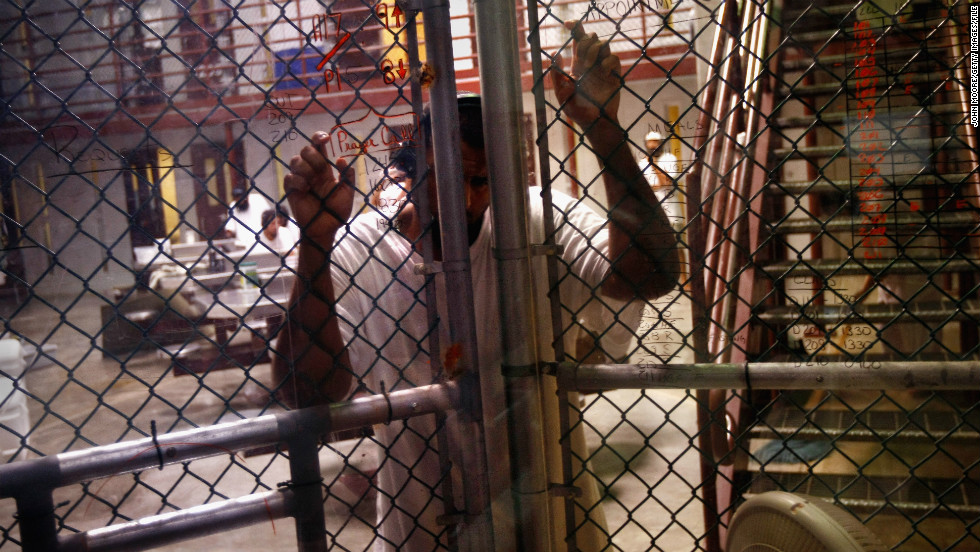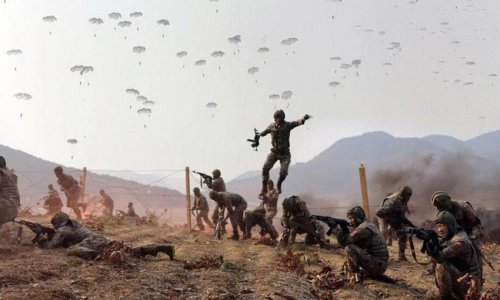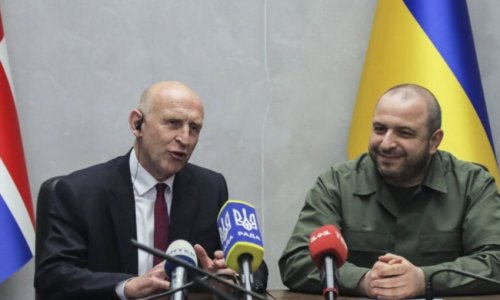Mohamedou Slahi was wearing black-out goggles. A guard dragged him onto a boat and someone forced him to drink seawater.
"It was so nasty I threw up...They stuffed the air between my clothes and me with ice cubes from my neck to my ankles...every once in a while one of the guards smashed me, most of the time in the face."
In a new book Guantánamo Diary, Slahi paints a horrifying picture of life at the hands of interrogators in the notorious U.S. military prison in Cuba. The book depicts long days in isolation, sometimes chained to the floor in agonizing positions, held in extreme temperatures, often deprived of food and sleep. On multiple occasions he describes being beaten and humiliated by his questioners. He says he was left "shaking like a Parkinson's patient" and felt one of his interrogators "was literally executing me but in a slow way."
The 44-year-old electrical engineer, originally from Mauritania, has been held in Guantánamo Bay since 2002. He was accused of being a member of al Qaeda and of recruiting three of the hijackers in the 9/11 terrorist attacks, as well as being involved in other terror plots in Canada and the United States. He's never been charged and his lawyers say there is very little evidence against him.
Slahi admits to traveling to Afghanistan to fight in the early 1990s, when the U.S. was supporting the mujahedeen in their fight against the Soviet Union. He pledged allegiance to al Qaeda in 1991 but claims he broke ties with the group shortly after.
The U.S. military continues to hold Slahi as an enemy combatant under the Authorization for the Use of Military Force of 2001 informed by the laws of war, according to Department of Defense spokesman Lt. Col. Myles Caggins.
Guantánamo Diary is the first published account from a serving detainee which is being made available to the public. Slahi hand-wrote the manuscript in his cell in 2005 and it took nearly seven years for Slahi's lawyers to get it approved for release. He describes his first few years of detention in what he calls his "endless world tour" of interrogation from Mauritania, to Jordan, to Afghanistan and finally Cuba.
In his early years at Guantánamo, Slahi was exposed to a number of special interrogation techniques that were personally signed off by then Secretary of Defense Donald Rumsfeld, according to reports by the Armed Services Committee and the Department of Justice. That included sensory and sleep deprivation, designed to grind him down, which wreaked havoc on his physical and mental health.
"I couldn't tell a thing about days going by or time passing; my time consisted of a crazy darkness all the time," Slahi writes. "I was starved for long periods and then given food but not given time to eat... "You have three minutes. Eat!" a guard would yell at me, and then after about half a minute he would grab the plate. "You're done!"".
Slahi says the brutality reached a peak in late 2003.
"I thought they were going to execute me," Slahi writes. "Thanks to the beating I wasn't able to stand, so [redacted] and the other guard dragged me out with my toes tracing the way and threw me in the truck, which immediately took off. The beating party would go on for the next three or four hours."
This period culminated in him being taken on a boat ride during which he was blindfolded and he says beaten for several hours.
It was during this time that Slahi says he began to make false confessions in order to stop the torture. At one point he says to his interrogator "Just tell me the right answer. Is it good to say yes or to say no?"
Responding to Slahi's allegations of torture, Caggins, the Pentagon spokesman, pointed to a number of investigations into Guantánamo detainee treatment. Many of Slahi's claims are corroborated by reports published by the U.S. Senate Armed Services Committee and the Department of Justice in 2008. The boat incident which Slahi describes in detail is mentioned in both reports, although neither provide complete details about what happened during this trip. Caggins also said "Slahi is eligible to appear before a Periodic Review Board to assess whether his continued detention at Guantanamo remains necessary."
Even in its published form, portions of Slahi's account are redacted. The U.S. Department of Defense says this was necessary to protect U.S. personnel and national security. In some sections of the book, several pages at a time are completely blacked out.
Slahi's lawyers hope the book will build pressure on the government to finally let him go. In 2010 a district court judge ruled he was being held unlawfully and ordered his immediate release. But the government appealed that decision and the case has been in legal limbo ever since.
"Unfortunately for the government -- and fortunately for the rest of us -- these secrets are out now," Slahi's lawyer, Nancy Hollander, told CNN. "The United States can't keep secret these things that it does any longer -- and it needs to close Guantanamo. It's as simple as that."
When U.S. President Barack Obama took office in 2008 he promised to close Guantánamo, but as he enters his seventh year in the White House 122 prisoners remain. At its peak there were more than 700. In Tuesday's State of the Union address Obama said his administration will work to finally "finish the job" and close it down.
"As Americans, we have a profound commitment to justice - so it makes no sense to spend $3 million per prisoner to keep open a prison that the world condemns and terrorists use to recruit," Obama said. "I will not relent in my determination to shut it down. It's not who we are. It's time to close Gitmo."
(CNN)
ANN.Az
Follow us !











